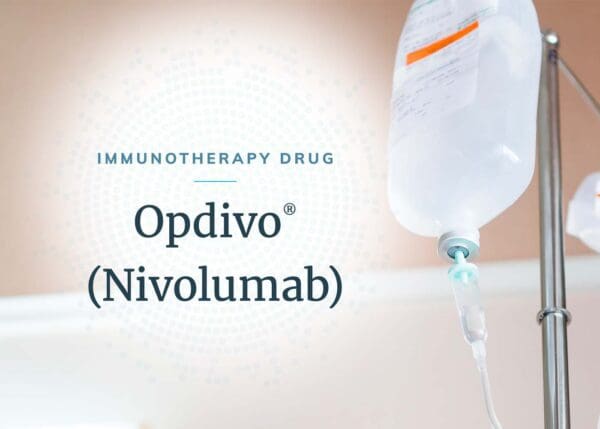01. What Is Opdivo?
What Is Opdivo (Nivolumab)?
Opdivo® (nivolumab) is an immunotherapy medication. It belongs to a class of drugs called immune checkpoint inhibitors. It interacts with certain proteins on immune system cells. This interaction allows immune cells to attack other cells they would normally ignore, such as cancer cells. Opdivo is also a type of monoclonal antibody, which is a synthetic immune system protein.
The U.S. Food and Drug Administration (FDA) has approved the use of Opdivo to treat several different types of cancer. When combined with Yervoy®, Opdivo has FDA approval as a first-line treatment for malignant pleural mesothelioma. Doctors may recommend Opdivo and Yervoy for adults with unresectable mesothelioma. Unresectable means it cannot be treated with surgery.
02. Opdivo and Mesothelioma
How Does Opdivo (Nivolumab) Treat Mesothelioma?
Opdivo works for mesothelioma by allowing the immune system to attack cancer cells. The drug blocks the PD-1/PD-L1 immune checkpoint. These checkpoints normally keep immune cells, called T cells, from attacking healthy cells. However, cancer cells can use these same checkpoints to hide from the immune system.
Once Opdivo blocks the checkpoints, T cells may recognize and attack cancer cells. Patients may experience side effects if the T cells also damage healthy cells.
Clinical trials and studies have tested Opdivo in mesothelioma cancer cases. In combination with Yervoy, it extended median survival compared to chemotherapy.
Opdivo (Nivolumab) and Yervoy for Malignant Pleural Mesothelioma
Opdivo and Yervoy have FDA approval to treat pleural mesothelioma when used together. Both are immune checkpoint inhibitors, but each targets different checkpoints. Opdivo affects the PD-1/PD-L1 checkpoint, and Yervoy affects the CTLA-4 checkpoint. Both mesothelioma drugs are given through injections.
The CheckMate 743 clinical trial tested the combination on all mesothelioma cell types, including the more aggressive biphasic and sarcomatoid types. The trial reported several encouraging results with this combination, including:
- Efficacy in all mesothelioma cell types: In general, biphasic and sarcomatoid mesothelioma cell types do not respond well to treatment. With Opdivo and Yervoy, these patients achieved a median survival of 18.1 months. This median survival matches that of the entire trial, which included all cell types.
- Improved median overall survival: Patients treated with Opdivo and Yervoy had a median survival of 18.1 months. This was approximately 30% better than patients treated with chemotherapy.
- Improved survival rates: Opdivo and Yervoy patients had survival rates of 68% and 41% at one- and two-year follow-up, respectively. Chemotherapy patients had survival rates of 58% and 27% at one- and two-year follow-ups, respectively.
Malignant pleural mesothelioma is a rare form of cancer that starts in the pleura, the lining around the lungs. It is caused by exposure to asbestos. In some cases, mesothelioma doctors do not recommend treating the cancer with surgery. Opdivo and Yervoy may be an option in such cases.
Opdivo (Nivolumab) and Yervoy for Asbestos-Related Lung Cancer
The Opdivo and Yervoy combination is FDA-approved to treat non-small cell lung cancer, which is a common form of lung cancer. Lung cancer can be caused by asbestos exposure.
CheckMate 227 was a phase III clinical trial for patients with stage 4 non-small cell lung cancer. During the study, researchers compared the Opdivo and Yervoy combination to chemotherapy. Patients treated with the Opdivo and Yervoy combination had a median overall survival of 17.1 months. For chemotherapy patients, the median overall survival was 13.9 months.
Opdivo is FDA-approved to treat some other types of cancer, such as melanoma and colorectal cancer. Opdivo may also be used in an off-label capacity.
Resources for Mesothelioma Patients
03. What to Expect
What to Expect During Treatment
Opdivo in combination with Yervoy is approved for the treatment of inoperable pleural mesothelioma. It is a relatively new mesothelioma treatment. This means patient experiences with different cancer or infusion centers may vary. But patients can expect treatment that generally follows the manufacturer’s recommendations.
According to the drug label, Opdivo and Yervoy treatment for mesothelioma involves:
- Treatment with Opdivo every three weeks
- Treatment with Yervoy every six weeks
On days when the patient receives both, Opdivo is given first through an infusion. Then, Yervoy is given through a different infusion line.
While many factors can affect infusion time, this immunotherapy treatment generally takes 30 to 60 minutes. Patients can receive Opdivo and Yervoy for up to two years. Doctors may shorten this time frame if the patient’s cancer grows or they experience toxic side effects. Patients should discuss specifics with their oncology care team.
Opdivo allows the immune system to attack cancer cells. It may also damage healthy cells. As a result, patients may experience some side effects that range from mild to severe. The care team will track the patient’s wellbeing and determine if they should pause or stop the Opdivo.
Preparing for Your Appointment
On the day of Opdivo treatment, patients may want to come prepared. How they prepare may depend on their specific treatment plan and the cancer center treating them. Patients can speak with their care team to find out what specific steps they should expect.
Some healthcare specialists recommend the following tips for immunotherapy patients:
- Diet: Some patients may benefit from a diet for mesothelioma patients. This may help give the immune system the nutrition it needs to fight cancer.
- Exercise: If safe for the patient, the health care team may recommend some mild exercise. This may also help activate the immune system.
- Sleep: Consistent good night’s sleep can help support the immune system. Patients may be encouraged to maintain good sleep hygiene before and after starting treatment.
On the day of treatment, patients may want to have someone drive them to and from the appointment. Cancer centers may recommend this until they know how treatments will affect the patient.
04. Benefits of Opdivo
Opdivo (Nivolumab) Benefits
Opdivo offers several potential benefits when used in combination with Yervoy. In pleural mesothelioma, Opdivo+Yervoy benefits include improved survival and quality of life. These benefits have been demonstrated in clinical trials.
In one study, researchers found the Opdivo and Yervoy combination improved survival rates over chemotherapy. Other benefits observed for Opdivo include:
- Lower rates of severe side effects versus another form of checkpoint inhibitor
- No mandatory pre-treatment preparation
- Not needing a surgically implanted port
The healthcare team can provide additional information about the possible benefits for Opdivo.
05. Side Effects of Opdivo
Opdivo (Nivolumab) Side Effects
Like many cancer treatments, Opdivo may cause a range of side effects. A patient’s healthcare team will watch for side effects during treatment. This can help ensure any adverse effects are managed promptly. Most side effects are short-term (called acute) and can be treated with medication.
Opdivo side effects can vary from person to person. During the CheckMate 743 trial, the most common side effects included:
- Abdominal pain
- Cough
- Decreased appetite
- Diarrhea
- Difficulty breathing
- Fatigue
- Itch
- Nausea
- Pain in the abdomen or muscle and joints
- Rash
The side effects above were reported by mesothelioma patients receiving Opdivo and Yervoy. As such, side effects from Opdivo alone may differ.
Treatment with Opdivo and Yervoy can sometimes cause serious reactions. Just over half of the people treated with Opdivo and Yervoy suffered severe side effects. Most of these side effects were manageable and responded to standard treatment. Patients should discuss their concerns about side effects with their care team.
Managing Side Effects
Patients may experience side effects while receiving Opdivo and Yervoy. But doctors have established protocols for managing these reactions.
Side effects can range from mild to severe. For mild side effects, doctors may recommend pausing treatment until symptoms go away. Some can be effectively managed with corticosteroids, such as prednisone.
With more severe side effects, doctors may recommend stopping treatment completely. In studies, patients who had to stop treatment did not lose the effects of the treatment.
Patients should speak to their doctor about side effects of Opdivo or any other medications they are prescribed.
06. Opdivo Eligibility
Who Is Eligible for Opdivo (Nivolumab)?
Eligibility for Opdivo treatment depends on several factors including tumor location and stage at diagnosis. The Opdivo and Yervoy combination is the only immunotherapy treatment that currently has FDA approval for mesothelioma. This approval is for adults with confirmed pleural mesothelioma that cannot be treated with surgery.
Patients interested in a checkpoint inhibitor treatment should speak to their doctor. The healthcare team will be able to determine if the treatment can benefit the patient.
07. Opdivo Studies
Clinical Trials and Studies on Opdivo (Nivolumab) for Mesothelioma
Researchers have tested Opdivo’s effectiveness in various mesothelioma clinical trials. The most notable trial was the phase III CheckMate 743 trial, which showed significant improvement in survival over standard-of-care treatment.
The study included 103 hospitals in 21 countries. It followed a total of 605 patients. Of those, 305 received chemotherapy using cisplatin or carboplatin and Alimta® (pemetrexed). Another 303 received immunotherapy with Opdivo and Yervoy.
Study results showed significant improvements in survival for patients receiving the Opdivo and Yervoy therapy. The median survival for immunotherapy was 18.1 months, compared to 14.1 months with chemotherapy.
On follow-up visits, Opdivo+Yervoy patients also showed positive overall response rates. These patients had a 68% survival rate at their one-year follow-up.
Opdivo (Nivolumab) as Second-Line Treatment
Another recently completed trial tested Opdivo’s effectiveness as a second-line treatment. Patients received prior treatment consisting of platinum-based chemotherapy. This particular study investigated Opdivo’s ability to help pleural and peritoneal mesothelioma patients. The trial patients had a 1-year survival rate of 43.4% compared to 30.1% with placebo.
Upcoming trials also plan to explore how Opdivo can benefit mesothelioma patients. Currently scheduled trials will focus on:
- Opdivo and Yervoy for peritoneal mesothelioma before surgery and heated chemotherapy
- Opdivo and Yervoy for pleural mesothelioma cases before surgery
- Using Opdivo as a second-line or later treatment with another monoclonal antibody
Patients interested in taking part in a clinical trial should discuss it with their doctor. The healthcare team can help determine eligibility and find trials that may suit the patient.












